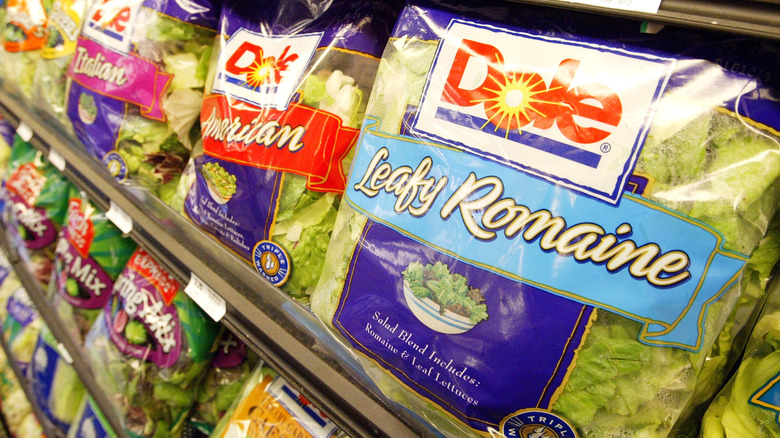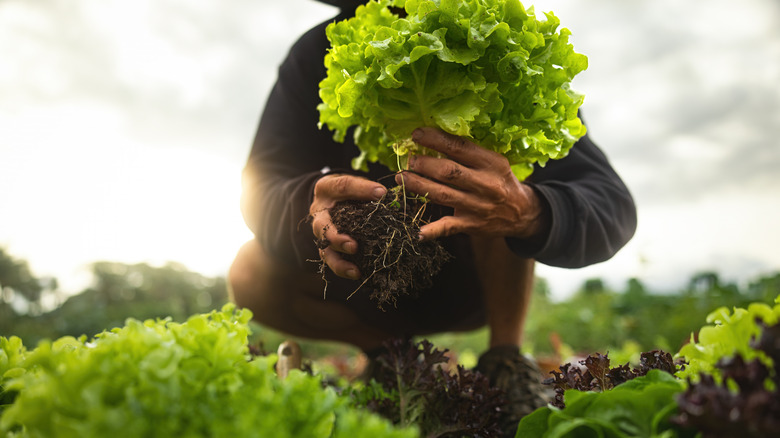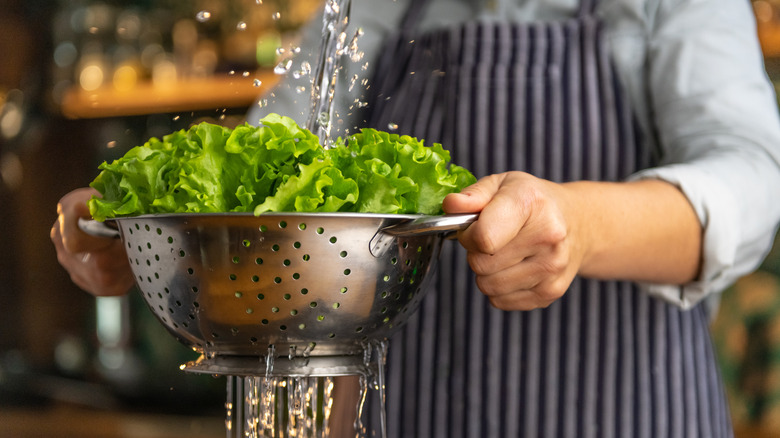Here's Why Bagged Salad Greens Are Labeled 'Triple-Washed'
Depending on the manufacturer, salad greens labeled "triple-washed" have likely been hosed down to rid them of any dirt and debris, dunked within an inch of their life in a food-safe sanitizer wash, and then dunked again in a rinse containing only slightly less sanitizer. But even if that process gets rid of 99% of all the nasties on the salad's surface, in the world of food safety, that's not necessarily comforting. It certainly beats the alternative, but the remaining 1% of pathogens still pack enough punch to make you and yours good and sick should you happen to ingest them. And therein lies the essence of what makes this label so confusing.
You've always been told it's a mistake to peel veggies without washing them. But if a bagged salad carries the triple-washed designation, it means you don't have to wash it again. In fact, you probably shouldn't. The washing process gets rid of the noticeable dirt and grime as well as most of the microscopic-sized yuckies on the leaves' surfaces.
Unfortunately, the salad manufacturer's power washer can't necessarily reach all the way into those little nooks along the leaves' veins and deeply bumpy spots. The upside? The pathogens that remain in the hidden places on the leaves are prevented from spreading and contaminating more of the salad because the sanitizer that remains on the salad after the wash stops the contamination from spreading.
What does the triple-washed label guarantee, if anything?
The United States Food and Drug Administration places no actual demands on food producers to say whether their salads are washed or not. Your bagged salads usually get washed. However, labels like "triple-washed" and the ubiquitous "thoroughly washed," are just the final steps in a company's overall efforts to manage potential hazards than they are guarantees that produce won't make you sick. It's a bit like using an ice bath to take bagged salad greens to the next level. It works wonders if the salad is wilted from improper storage for a few days, but it won't save a salad that's started rotting.
Similarly, keeping bugs — microscopic or otherwise — out of your bagged salad doesn't start with the rinse. If plants are grown in water that is itself filled with pathogens like E. coli, the plants' veins will greedily drink the water —and the microbugs that live in it. Once that happens, no amount of washing can make it safe to eat because the pathogens are inside the plant itself.
So to keep your food safe, the whole system needs to address the possibility of contamination, and at the manufacturer level, that starts with the water the manufacturer grows its produce in. More broadly, that's enforced by legislation, facility audits, and oversight practices designed to keep the food chain safer.
Should I wash my triple-washed salad again?
It's natural to take the matter into your own hands. (If you want a job done right and all.) However, that's a bad idea. Your kitchen sink and counters are a veritable colony of bacteria just waiting for a lunch opportunity. They'll gladly latch onto your salad and reintroduce pathogens where none were and probably set up house next to the ones that remain. And the extra scrub doesn't rid you of any bugs living inside the veins of the plants. Goodness knows there are plenty of everyday food safety mistakes you can work on avoiding instead.
However, if you simply cannot eat your bagged salad without another wash, at least go to the trouble of thoroughly hosing down the counter and the sink first. That reduces the chances of cross-contamination. You also don't need to do much. Soaking your lettuce leaves isn't advisable. Instead, just give them a rinse under the tap.


